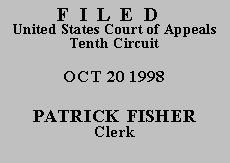

ELMOTIES BURROW,
Petitioner - Appellant,
v.
DONICE NEAL and ATTORNEY
GENERAL OF THE STATE OF
COLORADO,
Respondents - Appellees.
Before ANDERSON, McKAY, and
LUCERO, Circuit Judges.
Petitioner is a Colorado state prisoner. He was convicted by a jury in state court on December 15, 1998, of first degree murder, first degree assault, first degree sexual assault, aggravated robbery, and third degree assault. He was sentenced to seventy (70) years' imprisonment. His direct appeal was denied on August 23, 1990, and his post-conviction motion filed pursuant to Colorado Rule of Criminal Procedure 35(c) was denied as untimely on November 24, 1994.
Proceeding pro se, Petitioner filed a 28 U.S.C. § 2254 petition for writ of habeas corpus asserting a claim of ineffective assistance of counsel. The district court denied the petition as barred by the one-year limitation period in 28 U.S.C. § 2244(d)(1), denied Petitioner's accompanying motion for appointment of counsel as moot, and dismissed the action. The district court also denied Petitioner a certificate of appealability and denied his motion for leave to proceed on appeal pursuant to 28 U.S.C. § 1915. Petitioner now requests this court to issue a certificate of appealability so that he may appeal the district court's dismissal of his section 2254 habeas corpus petition. As part of his pro se brief, Petitioner also moves this court to allow him to proceed on appeal in forma pauperis.
We issue a certificate of appealability "only if the applicant has made a substantial showing of the denial of a constitutional right." 28 U.S.C. § 2253(c)(2). In his application and brief for a certificate of appealability, Petitioner attempts to make a substantial showing of the denial of two constitutional rights: ineffective assistance of counsel and a deficient "Curtis Advisement Hearing at trial on his constitutional right to testify." Petitioner's Opening Br. at 11-12. He does not dispute, however, the court's determination that his petition filed under 28 U.S.C. § 2254 was time-barred by section 2244(d).
After thoroughly reviewing the record and Petitioner's brief, we can discern no error in the district court's determination that Petitioner's habeas corpus petition was time-barred. Because Petitioner's conviction became final well before April 24, 1996, he had until April 23, 1997, to file a petition pursuant to 28 U.S.C. § 2254.(1) See 28 U.S.C. § 2244(d)(1)(A); United States v. Simmonds, 111 F.3d 737, 746 (10th Cir. 1997). Petitioner filed his Application for a Writ of Habeas Corpus Pursuant to 28 U.S.C. § 2254 on February 6, 1998. Therefore, his habeas corpus petition was untimely and there is no justification for granting a certificate of appealability.
Accordingly, we deny Petitioner's application for a certificate of appealability and dismiss this appeal. We also deny Petitioner's motion for leave
to proceed on appeal in forma pauperis.
DENIED and DISMISSED.
Entered for the Court
Monroe McKay
Circuit Judge
*. This order and judgment is not binding precedent, except under the doctrines of law of the case, res judicata, and collateral estoppel. The court generally disfavors the citation of orders and judgments; nevertheless, an order and judgment may be cited under the terms and conditions of 10th Cir. R. 36.3.
1. Petitioner has not alleged, and we see no evidence suggesting, that the tolling provision in 28 U.S.C. § 2244(d)(2) or the provisions in subsections B, C, and D of 28 U.S.C. § 2244(d)(1) have any role whatsoever in this case.